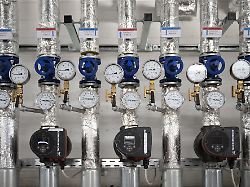Associations doubt the figures
Traffic light quantifies CO2 savings under the heating law
September 8, 2023, 1:43 a.m
The heating law literally causes a stir right up to the last second. Based on a study by the Oeko-Institut, the federal government expects a CO2 saving of almost 40 million tonnes of CO2 in the best case scenario. Associations don’t leave a lid on the calculation.
With the new heating law, the federal government wants to save 39.2 million tons of CO2 by 2030. This emerges from a study by the Öko-Institut, which was available to the “Bild” newspaper. Previously, contradictory figures from the green-led Ministry of Economic Affairs caused confusion and there was a lack of clarity in the traffic light coalition about the effects of the heating law.
In the new calculations, however, the federal government assumes “favorable framework conditions”: 70 percent of building owners who want to install or replace heating would therefore decide on eco-heating systems, such as a heat pump, before the heat planning has been completed.
In two other scenarios, 50 percent and 90 percent eco-heating is assumed. In a “worst case” scenario, a large majority of 90 percent do not decide on eco-heating until the end of the heat planning. In this case, according to the study, the CO2 savings would only be 10.8 million tons of CO2.
“Numbers not understandable”
Associations question the calculations. The president of the Haus & Grund owners’ association, Kai Warnecke, told the “Bild” newspaper: “Scenario one is completely unrealistic because owners can only make a decision after planning and alternative energy sources are available. This in turn is from the perspective of those responsible Cities and municipalities excluded during this period.”
Frederic Leers from the Federal Association of the Heating Industry said: “For us, the figures from the Oeko-Institut cannot be understood based on the publication. The calculation method is missing, savings from the respective types of heating remain without explanation.” A spokesman for the Association of Municipal Companies (VKU) said: “The probability of occurrence of none of the scenarios mentioned can be validly assessed.” Whether the 70 percent scenario actually occurs depends largely on the funding framework.
Roll-call vote in the Bundestag
On Friday, the “Ampel” wants to finally pass the controversial heating law in the Bundestag. A debate lasting around 80 minutes is planned, after which the Building Energy Act (GEG) will be voted on. According to the plans, newly installed heating systems will have to be powered by at least 65 percent renewable energy in the future.
From January 2024, the new rules will initially only apply to new buildings in new development areas. For all other buildings, municipalities should first submit heat planning. In an accompanying resolution, the traffic light factions also agreed on higher funding rates.
